AI重塑汽车产业版图:大众豪掷10亿欧元背后的全球竞赛
在全球汽车产业的转型进程中,人工智能正逐渐成为新的决定性力量。近日,大众汽车集团宣布,到2030年将在AI领域累计投资10亿欧元,涵盖研发、生产与信息技术基础设施,目标是实现“全流程AI化”。这一动作不仅关乎大众汽车自身的转型挑战,更是整个行业迈入智能化新时代的缩影。
大众的布局并非空穴来风。目前,集团内部已在运行超1200个AI应用,涵盖设计、供应链、生产与市场环节。未来,大众计划将AI深度嵌入新车型开发,从概念车到量产车实现全链路提效,预计可将研发周期缩短约25%,同时降低成本高达40亿欧元。首批搭载AI赋能平台的车型将包括大众的入门级纯电SUV ID. CROSS,其定位直指欧洲主流市场的价格敏感区间,并计划搭载自研的Unified Cell电池与L4级自动驾驶系统。与此同时,大众还与地平线、小鹏等企业展开合作,共同研发下一代电子电气架构和自动驾驶技术,体现了其开放、务实的战略路径。
从宏观来看,AI正全面改写汽车产业的价值逻辑。过去,车企的核心竞争力集中于硬件,而今天,“软件定义汽车”成为共识,盈利模式也正从一次性销售转向长期的软件与服务收费。AI不仅提高研发和生产效率,还拓展了汽车的功能维度,推动智能座舱、自动驾驶、能源管理等领域的系统性变革。
全球车企正加速进入AI“军备竞赛”。特斯拉凭借Dojo超算与数据闭环保持领先,中国新势力如小鹏、理想率先将AI确立为战略核心,传统巨头如吉利、广汽也在加速追赶。大众的10亿欧元投资,或许不及特斯拉和中国企业的激进,但凭借其深厚的制造底蕴、庞大的规模优势和开放的合作生态,依然具备后来居上的潜力。
AI的应用不仅关乎企业个体的竞争,更关乎整个产业的重塑。谁能率先打通数据、算法、算力与场景的闭环,谁就能在未来竞争中掌握主动。对于大众而言,这笔投资是一张通往智能汽车时代的“入场券”;而对整个行业而言,这场AI竞赛的成败,将深刻影响未来汽车产业的价值分配与全球格局。
Artificial intelligence is rapidly emerging as the defining force in the transformation of the global automotive industry. Volkswagen Group recently announced a €1 billion investment in AI by 2030, spanning R&D, manufacturing, and IT infrastructure, with the aim of achieving “end-to-end AI integration.” This move not only reflects Volkswagen’s own transformation challenges but also epitomizes the industry’s broader shift into the intelligent era.
Volkswagen’s strategy is far from speculative. The Group already operates more than 1,200 AI applications across design, supply chain, and production. Going forward, it plans to embed AI throughout the vehicle development process, from concept to mass production, with the goal of reducing development cycles by around 25% and saving up to €4 billion in costs. Upcoming AI-enabled models include the entry-level electric SUV ID. CROSS, designed for Europe’s price-sensitive market, equipped with Volkswagen’s proprietary Unified Cell battery and L4 autonomous driving technology. In parallel, partnerships with Horizon Robotics and XPeng highlight the company’s pragmatic and open approach to accelerating intelligent capabilities.
On a broader scale, AI is reshaping the very logic of value in the automotive industry. Once defined by hardware, competitiveness now hinges on software, with business models shifting from one-off sales to recurring services. AI not only accelerates design, materials research, and validation but also expands functional dimensions across intelligent cockpits, autonomous driving, and energy management.
Global automakers are already in an AI “arms race.” Tesla leads with its Dojo supercomputer and data loop, while Chinese EV startups such as XPeng and Li Auto have placed AI at the heart of their strategies. Traditional OEMs like Geely and GAC are rapidly scaling up investments. Volkswagen’s €1 billion bet may not be the boldest, but with its industrial depth, scale, and collaborative ecosystem, the company retains the potential to catch up.
The stakes go beyond any single company. The winners will be those who can integrate data, algorithms, computing power, and real-world applications into a closed loop. For Volkswagen, €1 billion is an entry ticket into the intelligent era; for the industry at large, the AI race will ultimately redefine value creation and reshape the competitive landscape.

